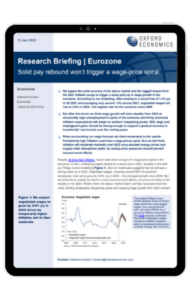Solid pay rebound won’t trigger a wage-price spiral in the eurozone

We expect the solid recovery of the labour market and the lagged impact from the 2021 inflation surge to trigger a sharp pick-up in wage growth in the eurozone.
What you will learn:
- According to our modelling, after slowing to a record low of 1.4% y/y in Q3 2021 and averaging only around 1.5% across 2021, negotiated wages will rise to 2.6% in 2022 – the highest rate for the eurozone since 2009.
- But after this burst, we think wage growth will slow steadily from 2023 as structurally high unemployment in parts of the eurozone and firmly anchored inflation expectations will weigh on workers’ bargaining power.
- Risks surrounding our wage forecast are tilted moderately to the upside.
Tags:
Related research

Post
House prices continue to slide for China’s cities
Research Briefing Solid pay rebound won’t trigger a wage-price spiral in the eurozone While the property market downturn has been universal, the scale and depth has been varied for different cities and regions.
Find Out More
Post
The Construction Productivity Challenge in Australia
Delve into the state of construction productivity in Australia. Understand the factors affecting growth and how innovation can transform the industry for the better.
Find Out More
Post
Australia’s future outlook: Net overseas migration trends
Australia’s student migration slowed in FY2025 as higher fees, testing standards, and provider caps took effect. While net overseas migration eased to 280,000, favourable currency settings, stronger work rights, and a higher student cap signal modest growth opportunities ahead.
Find Out More